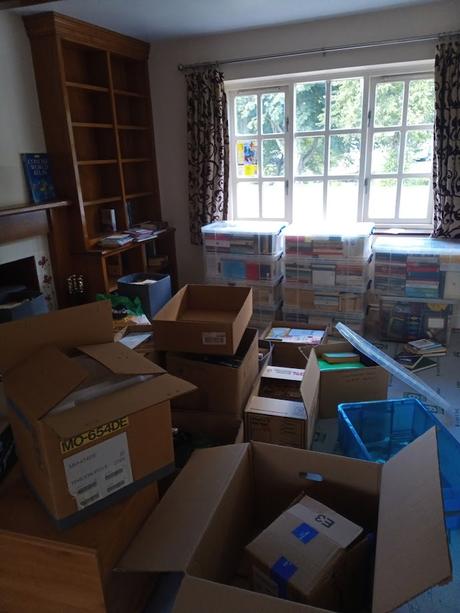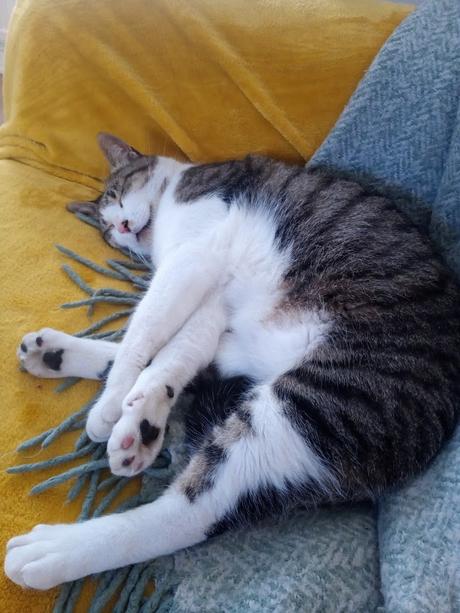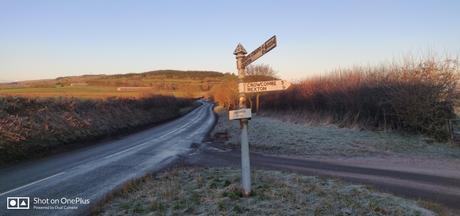When our son is asked what his parents are like, he says that his mother is the most introverted person he knows and his father is the most extroverted. As a shorthand way of describing us, it’s not so very far off. When the first lockdown began, Mr Litlove had a long list of commissions to work through, but as the months went by, he made his customers the furniture they’d asked for, and by August of 2020, he was up to date with no further work coming in. He knew he ought to be working on new designs of his own, but as the quiet and isolation gave me energy, so those same circumstances drained it from him. He missed his regular meetings with his friends at the green woodworking club, and the boathouses along the river Cam remained locked for the duration. And then, of course, I had my diagnosis. Probably the one saving grace of this time was that he was unable to be with me for any of my meetings or treatments. Mr Litlove really doesn’t like medical situations.
But it’s very hard, I think, watching a partner go through these things. All of the threat is there, but none of the catharsis. We both wanted to emerge from the experience feeling closer, but we didn’t. Instead I think the pandemic left us like many couples, having spent too much time trying to use the relationship to compensate for everything we were having to forego, facing each other across the worries and the uncertainty with no answers. By the end of a year, I think we’d just run out of conversation. And Mr Litlove had lost his creative mojo. He had a spate of new commissions and was back in the workshop, but with more effort and less joy. We were keenly aware that in just over a year, he’d be able to access the pension we’d been saving into for decades. For once, we could shake up our lives.
Ever since 2018, when we’d tried to sell our house and couldn’t, we’d been aware that we needed to address some of its issues. I mean, don’t get me wrong, I’ve not been living in a hovel all this time. But the back of the house was poorly organised and badly built. Fast forward through the next eighteen months of finding an architect, figuring out what we wanted and gaining planning permission, to May of 2023, when we finally found a builder we liked who could do the work. Somehow we’d gone from a fairly modest list of requirements to deciding to take the whole back of the house off and rebuild it. We’d need to be out of our home for a year, and before that, we’d need to clear it of our belongings and find a place to live. We had two and a half months to do that before work began.
We’d been in our house for 26 years, brought up a son in it, and both had one career and then embarked on another. The clutter was unbelievable. I began to notice, as never before, just how many houses there were in the street, the village, the area. Each house might hold as much stuff as ours did. I began to think, uncomfortably, of landfill sites and rubbish tips, of forever chemicals and indestructible plastics. We tried our best to find new homes for the things that we had to throw away, contacting charities, listing household items on Gumtree and Freecycle. It’s really hard to give stuff away, it turns out. I couldn’t even persuade my son, the therapist, to take my Freud collection. In the end, I managed to give away 40 boxes of books. I’m most proud of the three I donated to the local sixth form college, because I had to curate them to meet the stringent requirements of the librarians there, who were mindful of their finite space. I decimated my collection of French novels with a fist around my heart, every book an article that would now never be written. But I had so many books, and it was eleven years since I’d left the university; I wouldn’t be going back. I donated my French books to the MML library at the university and found great solace in unpacking them with the librarians there, enjoying their excitement (I had a very cool collection, if I say so myself). It’s all you want, really, to find a place where the things you’ve loved will be appreciated.

For some time our cats were the fluffy obstacle between us and the possibility of rental accommodation. We’d had an idea that it would be nice to relive our student days in central Cambridge, but the only places that would accept pets offered a standard of living that reminded us of being students in ways that were less enticing. Then, by chance, we found a cottage to rent on the other side of the village green to our house, and the landlord was willing to accept our cats. But there was a snag. We were only offered six months as the landlord wanted to renovate the place. There was nowhere else for us to go, and the cottage was extremely convenient. We took it and moved ourselves in, with a mere ten days before the demolition crew arrived.

It was a very odd sensation, to be living across the road, in full view of our house as it was being knocked down. I didn’t watch, couldn’t watch. Through the long years of CFS, that house had been my second skin, the safe carapace I lacked in dealing with the world. It had contained me in times of extreme fear, and provided me with the room of my own in which to write my lectures, books, this blog. Mr Litlove brought me back to the present by ending up in A & E. He’d been out with three bin bags of our son’s old teddies, trying to find a charity shop that would take them. When he finally did, he was jogging back to the car to pick up the bags and tripped over a metal chain slung low between two bollards, landing on his forehead. He had the immense good fortune not to break his glasses, his teeth or any bones. If only he’d been carrying the bin bags when he fell! What an air bag that would have been! I had a few qualms, I admit, wondering if it was the revenge of the teds in some form, bad karma for trying to get rid of them in the first place. Mr Litlove ended up with a scar on his forehead that, in some lights, makes him look like Harry Potter. The teddies are with us still.

Autumn brought the rain storms. The half of our house that was standing took a real battering. We’d naively hoped that we could preserve the front of the house as it was, and have rooms ready to move back into, but Storm Babet passed through with other ideas. The water penetrated the rough and ready defences we’d put in place, seeping into the bookcases in my study, running through the plaster in the ceiling of our bedroom. Any remaining carpet was soaked. Added to the general muck of building work, the house was beginning to look derelict. I took the remaining books off the shelves and boxed them up, a dozen or so coming with me to the cottage for intensive care in the airing cupboard (they all made it). The builders were rushing to get the roof on that would shelter us from further storms, and, with further bad weather forecast, we were relieved when the work went smoothly.
But fate had one more blow to deliver to Mr Litlove. One morning in November, the builders called us to say his workshop had been broken into. They’d arrived to find the door hanging open and had at first thought he was there unusually early, until they looked closer. Mr Litlove rushed over to find his worst fears confirmed. The thieves had known what they were doing; they had cleaned him out. All his good tools had been stolen, about £10k worth, a collection he’d put together over the past thirty years. The police didn’t even bother to come out to us. They asked if we knew who had done it, and when we said we didn’t, they closed the case before it was opened for lack of lines of inquiry. I ask you to consider that again for a moment – the police refused to help us because we didn’t know who committed the burglary. How many crime novels have I read? Things took a turn for the worse a few weeks later, when Mr Litlove noticed his tools appearing for sale on eBay. The company was supremely indifferent; the one link they offered to signal stolen goods was broken. Mr Litlove returned to the police, having tracked down the names and contact details of a couple of sellers fencing his stuff, and reluctantly they assigned him a crime number. This was as much as they did. The policeman on his case failed to get eBay to respond to his emails either, and that was that.
Mr Litlove was losing it. He was obsessively checking eBay, watching more of his tools come up for auction and be sold for a tiny fraction of what they were worth. EBay is almost impossible to contact outside of a handful of futile email forms. He finally found a telephone number for their Irish offices and rang it repeatedly, every time being fobbed off with some vague promise the matter would be looked into (it never was). He emailed the policeman, who didn’t respond. I contacted the local press and a journalist came to interview Mr Litlove because he was working on a related story – a bicycle shop up the A10 had been broken into one night and the entire stock stolen: £100k worth of bikes. This was just before Christmas, a loss the business might never recover from. The police hadn’t gone out to see them, either. If we didn’t know it before, we knew then that our case was too insignificant to warrant anyone’s time and attention. The police are under-resourced and eBay is quite content to traffic in stolen goods. There would never be any answers.
There was one bright spot on the horizon, however: we’d found somewhere to go in January when the lease on the cottage ran out. I’d suggested to Mr Litlove something he’d wanted to do for almost ten years: a residential course at a fine woodworking workshop. When he originally thought about it, he’d considered a full year, but that was too much for our time and our budget. But we could do a couple of months. Mr Litlove chose a workshop in Somerset, and we went down to visit the place. He loved it, and the owner of our AirBnb knew a neighbor who’d recently turned the stables of her house into holiday cabins and would be interested in a longer let. We took one. I was counting down the weeks until we could leave Cambridge, put the burglary behind us, forget the issues with the house for a while, and just be somewhere different. Christmas came and went. The cats went on their own adventure to my mother-in-law’s and I packed up our belongings once again. We took with us only what we could fit into our small car; after all we were going to be living in what was essentially one room. And on a bright January day we left East Anglia far behind us.

So much for concision! Part 3 in a few days…
